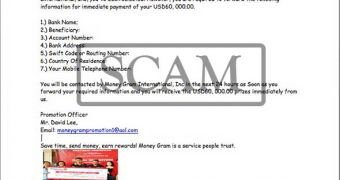Scammers are sending out fake MoneyGram International messages that claim the company is rewarding customers with $60,000 (€43,000) as part of its 73-year anniversary. The goal of this scam is to get unsuspecting users to pay various fees that are allegedly needed to collect the prize money.
The fake emails are entitled “Thank you for using Money Gram” and they read something like this:
“For 73 years, Money Gram International, Inc. has been connecting people. At Money Gram, there's so much more than money you're sending. Every sender and Receiver is important to us. To celebrate our 73rd Anniversary, we're rewarding our customers with prizes of USD60, 000.00.
The Promotion is open to everyone around the globe aged 18 or over. The Promotion is valid from 7th of August 2013 to 31st of December 2013 and while Stocks last, both dates inclusive, and such longer period as determined by Money Gram in its absolute discretion.
Because you sent money on-line, from an agent location or received money through Money Gram International, Inc, you've been selected. However, you are required to forward the following information for immediate payment of your USD60, 000.00.”
Recipients are asked to send their name, bank name, account number, bank address, routing number or swift code, country and mobile phone number to an email address specified in the bogus notification.
Hoax Slayer warns that the scammers who run this campaign have two things in mind: personal information and money. After users respond to the emails with their details, they’re asked to pay fees that are supposedly needed to cover banking, legal insurance or transfer costs.
Since the emails don’t have anything to do with MoneyGram International, no one ever wins anything. The crooks on the other hand can make a lot of money from unsuspecting internauts. In addition, the information they harvest can also be monetized in various ways.
If you come across such emails, simply ignore them. In these situations, it’s difficult for victims to get back any of their money since, in most cases, the fraudsters ask them to make the payments via untraceable services such as Western Union.

 14 DAY TRIAL //
14 DAY TRIAL //